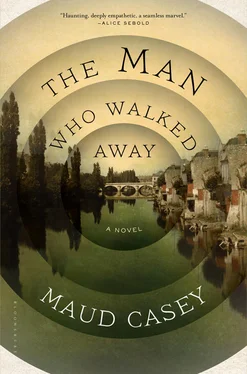“I will stay in the asylum,” Albert says.
You will not walk.
“I will not walk.”
You will not walk. And if you leave again, we will find you. We will bring you back.
The Doctor blows gently on Albert’s eyelids.
Ring ( shadow ring ).
Does this ring a bell? The sharp, quick sound of love in Albert’s ears.
Albert, you are a good sleeper.
Somewhere in the sky, the birds and the Doctor’s voice chirp together: If you walk far away, we will bring you back.
“Thank you. I’m so glad to hear that.”
Now it is time to wake up.
The Doctor blows once more, breathing him back into the world.
He opens his eyes.
“May we do that again?” he asks.
“Tomorrow,” the Doctor says. “We will do it again tomorrow.”
“I heard about a doctor who told a woman, ‘When you wake up there will be a dog with a monkey on its back doing a dance.’” Nurse Anne dances her fingers across the Director’s desk to illustrate. They are there to discuss the recent problems with the veteran, but the Doctor’s new intervention has proved a distraction. “When she woke,” Nurse Anne says, “There it was, a dog, and a monkey on its back! But there was a bear too. He didn’t know she had that up her sleeve. Still, the woman jumped right into his arms, which is what the doctor wanted all along.”
“There are a lot of stories,” says the Doctor. “But this isn’t that.” He knows she is teasing him but he doesn’t want to be teased. He wants the Director and Nurse Anne to understand exactly what has happened but he isn’t sure he knows. How could he explain, for example, how surprised he was by the softness of Albert’s hair? That when he was rehearsing on the train, he imagined it would be bristly but it is as soft as the dandelion flowers his mother used to string into a crown for him as a boy. That as he concentrated, making circles with his fingertips on Albert’s head, speaking those words— Shh, Albert, shh. You are sleeping. You are a good sleeper. Your arms and legs are motionless. Shh. You are sinking —only foolish words, there was a subtle, drowsy movement as Albert’s head swayed slightly underneath his fingers? You are disappearing , and the smell of wildflowers through the open window was the smell of disappearing.
Around and around, his fingers continued to draw circles, circling back to his own boyhood, when his village was the world. What else was there? Until the great Léotard whirred into town, bringing with him that invitation to leap over thousands of heads, there was only his village. Now, in the room with Albert, there was so much to know; so much that was unknowable. It was all so mysterious, what lay inside that skull beneath his fingers. Albert’s eyes flickered underneath his closed eyelids; his neat little mustache twitched; his head tilted the same way it had when the Doctor showed him the map of his travels, as though he were listening to something far away. How could he explain that he could see something stirring beneath Albert’s skin? That it was as though Albert were out on a ship on his own private ocean, a very different ship than the ship where the Doctor had served as a cargo clerk so long ago, so seasick he thought he would die out there, despairing of what would become of him. But Albert seemed neither orphaned nor alone. The sadness vanished from the corners of his big, hooded eyes; his lined forehead smoothed. His large ears were no longer absurd but somehow strangely elegant. Beneath the surface of that long face — almost handsome in the dusky light — there was a slight trembling, and then the trembling slipped beneath the Doctor’s own skin. It rushed through him, and it was as if he were the lady and someone had slipped a tube of brandy down his shirt, whispering softly, Eau de vie . It was he who was drunk. How could he explain that until then his whole life felt as though it were an argument against itself, but in that room there was no argument?
“I heard of a patient,” the Director says, laughing. “He went to sleep. The doctor had him convinced he was Caesar. Et tu, Brute! ”
“ The hypnotized belongs to the hypnotizer as the traveler’s stick belongs to the traveler ,” the Doctor says. It is something the great doctor was quoted as saying in a recent journal article. “All I know is something useful happened. That’s all I know.” He knows only what it is not; what it is has not yet taken shape. “This is not the great doctor pointing to a brain on a table.” The Doctor hears that prickle in his voice. “This is something else entirely.”
“ Oh, come, now, we’re only making fun,” says the Director.
“Some fun must be allowed,” Nurse Anne says, her hand on his arm. “Especially after you left without telling Albert where you were off to, after you left me to deal with the tribe of walkers.”
“I. .” the Doctor begins, but she’s already out the door, headed to the common room. “It is a flaw in your design,” Walter is saying. “I am not a design!” Rachel protests. “I am making the funicular first,” Elizabeth announces. “So that the people won’t walk up the hill before it is done.”
“ That ,” Nurse Anne says, looking over her shoulder, “is your fault. You started that. If you hadn’t told her to build that funicular first. .”
“We can’t all be perfect like you.”
“Children,” the Director says. He puts a hand on the Doctor’s shoulder. “If you think this will work, continue.”
And so he does.
The Doctor finds Albert waiting patiently in his room looking out the window to the square. That large head balanced on that wiry, pipe-cleaner neck sticks out from between those thin, slumped shoulders rolling forward, knobby waves.
How had the Doctor not realized it before? Every morning, he pedals through that square. Albert has surely seen him, riding past the stone justices, wincing under their glare, a man among all the others on their way somewhere. He has surely seen the Doctor pedaling eagerly on the way to him.
“What do you see out there?” the Doctor asks
“Do you see the house across the way?” Albert asks. “Upstairs the mother brushes her daughter’s hair and downstairs the father sits alone reading his newspaper. See, through that window? The newspaper spread across his lap. Every day, they are never in the same room.”
The Doctor pours a glass of water from the pitcher on the bedside table and offers it to Albert but he shakes his head no.
“They are like me,” he says. “I am living in different rooms. But with no doors between them.”
“There are doors. We will find the doors,” the Doctor says, and because he wants more than anything to help Albert find a door, any door, there is something else he wants to say. “Albert, I’m sorry I left in such a hurry to go to Paris. I was in a rush. But that is no excuse. I was careless. I hope you will forgive me.”
The sun’s light frames Albert’s head and his large, sad eyes. The Doctor is reminded of the picture the photographer showed him of the shimmering black cloud hovering over the fierce girl’s head. The light framing Albert creates a similar vibration, a vibration that exceeds his body.
“You came back,” Albert says simply.
Out in the world, it is the end of any other day, but inside the Doctor feels it; the day is about to distinguish itself.
A basin clatters somewhere down the hall. “Give me that,” Nurse Anne says.
The Doctor places his fingers on top of Albert’s head. “Shh, Albert, close your eyes.” If the man reading his newspaper in his separate room, pausing for a moment, looked out his window in their direction, what would he see? What would he make, the Doctor wonders, of this peculiar, two-headed shadow?
Читать дальше












